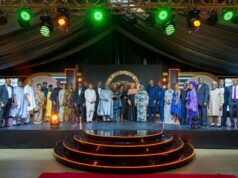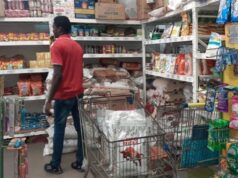THUR, JUN 11 2020-theG&BJournal-Vice President Yemi Osinbajo, Chair of Nigeria’s Economic Sustainability Committee (ESC) today presented “Bouncing Back: The Nigerian Economic Sustainability Plan– broad base recommendations by the Economic Sustainability Committee aimed at providing succour to Nigerians, and in response to the threat of the most severe economic downturn induced broadly by the COVID-19 pandemic.
The Committee recommendations include the provision of ample support for the informal sector which accounts for about 65% of Nigeria’s GDP, through low interest loans. It also recommended easing procedures for registration, licensing and obtaining permits for players in the sector.
‘’By these means, urban and informal business people like mechanics, tailors, artisans, and petty traders, will be encouraged to improve and develop their services,’’ the Committee said.
This will be the first time that the country’s informal sector will be factored into any future national economic plan, and the latest sign of the President and his administration’s growing enthusiasm for the informal sector.
The sector is largely responsible for the Federal Government’s recent decision to ease lockdown across the country and all reasons point to the impact the COVID-19 lockdown have hard on stakeholders in the sector.
A recent survey by the National Bureau of Statistics (NBS) shows that 42% of the poorest Nigerians-mostly engaged in the informal sector-lost their jobs to the COVID-19 related issues.
According to the Vice President Osinbajo, their recommendations is based on a strategy hinged on Mr. President’s mantra to “produce what we eat and consume what we produce”
In other words, to create millions of new jobs, we need to focus on encouraging local production, local services, local innovation, and emphasize the use of local materials. Nigeria and Nigerians can produce our food, build our houses and construct our roads, using local materials in all cases. If we must import, it must be to support local production.
‘’We have therefore recommended that we must carry out mass programmes that create jobs and utilise local materials,’’ Vice President said.
Included in the report of the Committee are recommendations that will for a Mass Agricultural Programme, which is expected to bring between 20,000 and 100,000 hectares of new farmland under cultivation in every State of the Federation and create millions of direct and indirect job opportunities.
(ii) Extensive Public Works and Road Construction Programme focusing on both major and rural roads and using locally available materials like limestone, cement and granite.
(iii) Mass Housing Programme to deliver up to 300,000 homes annually, engaging young professionals and artisans who form themselves into small and medium scale businesses within the construction industry, using indigenous labour and materials.
(iv) Installation of Solar Home System, targeting 5 million households, serving about 25 million individual Nigerians who are currently not connected to the National Grid.
The Committee also recommended –
(i) support for local production and manufacturing of all that is possible, including tech apps, software, shoes, garments, steel fabrication, ceramics and furniture, with the required capital and essential machinery.
(iii) Support for MSMEs, especially in assisting to restructure their loans with banks. Among others, this will assist businesses in the pharmaceutical, aviation, hotels and the hospitality industry, private schools, road transportation, technology companies, and the creative industry, amongst others.
(iv) Facilitation of broadband connectivity across the country and creation of a wide variety of technology and ICT jobs.
(v) Expansion of the Social Investment Programme, through an increase in the number of cash transfer beneficiaries, N- Power volunteers and sundry traders enjoying small and micro loans through the MarketMoni and TraderMoni schemes. The pre-existing conditional cash transfer will also be extended to cover a larger number of the extremely poor.
The Committee was set by President Muhammadu Buhari on the 30th of March, 2020 with mandate to develop a clear Economic Sustainability Plan in response to challenges posed by the COVID-19 pandemic, propose monetary policy measures in support of the plan, provide a Fiscal/Monetary stimulus package, including support to private businesses (with emphasis on strategic sectors most affected by the pandemic) and vulnerable segments of the population.
It also was mandated to identify fiscal measures for enhancing distributable oil and gas revenue, increasing non-oil revenues and reducing non- essential spending, towards securing sufficient resources to fund the plan, articulate specific measures to support the States and FCT, propose a clear-cut strategy to keep existing jobs and create opportunities for new ones, and identify measures that may require legislative support to deliver the Plan.
|twitter:@theGBJournal|email: info@govandbusinessjournal.com.ng|









